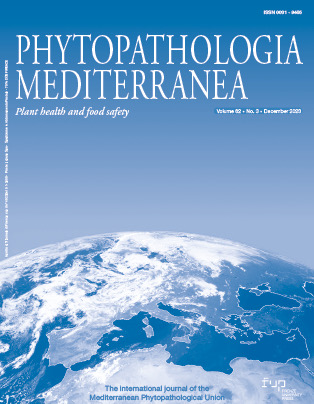Articles
Categories
Published 2023-12-30
Keywords
- Minor root pathogens,
- molecular characterization,
- pathogenicity assays
How to Cite
[1]
C. `TSOUKAS, A. `VENIERAKI, D. SAVVAS, and E. PAPLOMATAS, “First report of Pythium root rot of hydroponic lettuce (Lactuca sativa) in Greece, caused by Pythium Cluster B2a sp”., Phytopathol. Mediterr., vol. 62, no. 3, pp. 355–359, Dec. 2023.
Copyright (c) 2023 Christos `TSOUKAS, Anastasia `VENIERAKI, Dimitrios SAVVAS, Epaminondas PAPLOMATAS

This work is licensed under a Creative Commons Attribution 4.0 International License.
Abstract
Pythium root rot has been reported in several countries, but in Greece this disease was first detected in 2021, causing severe yield losses in a hydroponic lettuce crop. Isolations, morphological and molecular characterization, as well as pathogenicity assays identified a Pythium Cluster B2a species causing the disease in hydroponically grown lettuce. This is the first report of Pythium Cluster B2a sp. causing lettuce root rot in Greece.
Downloads
Download data is not yet available.
References
- Barbosa G.L., Gadelha F.D.A., Kublik N., Proctor A., Reichelm L., … Halden R.U., 2015. Comparison of Land, Water, and Energy Requirements of Lettuce Grown Using Hydroponic vs. Conventional Agricultural Methods. International Journal of Environmental Research and Public Health 12: 6879–6891. https://doi.org/10.3390/ijerph120606879. DOI: https://doi.org/10.3390/ijerph120606879
- Cacciola S.O., and Gullino M.L., 2019. Emerging and re-emerging fungus and oomycete soil-borne plant diseases in Italy. Phytopathologia Mediterranea 58(3), 451–472. https://doi.org/10.14601/Phyto-10756
- Choi Y.J., Beakes G., Glockling S., Kruse J., Nam B., … Thines M., 2015. Towards a universal barcode of oomycetes - a comparison of the cox1 and cox2 loci. Molecular Ecology Resources 15: 1275–1288. https://doi.org/10.1111/1755-0998.12398. DOI: https://doi.org/10.1111/1755-0998.12398
- Garibaldi A., Gilardi G., Matic S., Gullino M.L., 2017. First Report of Stem Rot Caused by a Pythium Cluster B2a Species on Lettuce in Italy. Plant Disease 101: 1681. https://doi.org/10.1094/PDIS-01-17-0124-PDN. DOI: https://doi.org/10.1094/PDIS-01-17-0124-PDN
- Jeffers S.N., 1986. Comparison of Two Media Selective for Phytophthora and Pythium Species. Plant Disease 1038. DOI: https://doi.org/10.1094/PD-70-1038
- Kumar S., Stecher G., Li M., Knyaz C., Tamura K., 2018. MEGA X: Molecular evolutionary genetics analysis across computing platforms. Molecular Biology and Evolution 35: 1547–1549. https://doi.org/10.1093/molbev/msy096. DOI: https://doi.org/10.1093/molbev/msy096
- McGehee C., Raudales R.E., Elmer W.H., 2018. First Report of Pythium dissotocum Causing Pythium Root Rot on Hydroponically Grown Lettuce in Connecticut. Plant Disease 102: 2043. https://doi.org/10.1094/PDIS-02-18-0365-PDN. DOI: https://doi.org/10.1094/PDIS-02-18-0365-PDN
- Pantelides I.S., Tsolakidou M.-D., Chrysargyris A., Tzortzakis N., 2017. First Report of Root Rot of Hydroponically Grown Lettuce (Lactuca sativa) Caused by a Pythium Species From the Cluster B2a Species Complex in Cyprus. Plant Disease 101: 636. https://doi.org/10.1094/PDIS-07-16-0972-PDN. DOI: https://doi.org/10.1094/PDIS-07-16-0972-PDN
- Robideau G.P., De Cock A.W.A.M., Coffey M.D., Voglmayr H., Brouwer H., … André Lévesque C., 2011. DNA barcoding of oomycetes with cytochrome c oxidase subunit I and internal transcribed spacer. Molecular Ecology Resources 11: 1002–1011. https://doi.org/10.1111/j.1755-0998.2011.03041.x. DOI: https://doi.org/10.1111/j.1755-0998.2011.03041.x
- Savvas D., Giannothanasis E., Ntanasi T., Karavidas I., Drakatos S., … Ntatsi G., 2023. Improvement and validation of a decision support system to maintain optimal nutrient levels in crops grown in closed-loop soilless systems. Agricultural Water Management 285: 108373. https://doi.org/https://doi.org/10.1016/j.agwat.2023.108373. DOI: https://doi.org/10.1016/j.agwat.2023.108373
- Shimizu S., Tojo M., 2021. First Report of Pythium Cluster B2a Species Causing Root Rot in Welsh Onion in Japan. Plant Disease 106: 336. https://doi.org/10.1094/PDIS-06-21-1211-PDN. DOI: https://doi.org/10.1094/PDIS-06-21-1211-PDN
- Stanghellini M.E., 1986. Yield Loss in Hydroponically Grown Lettuce Attributed to Subclinical Infection of Feeder Rootlets by Pythium dissotocum. Plant Disease 1053. DOI: https://doi.org/10.1094/PD-70-1053
- Utkhede R.S., Lévesque C.A., Dinh D., 2000. Pythium aphanidermatum root rot in hydroponically grown lettuce and the effect of chemical and biological agents on its control. Canadian Journal of Plant Pathology 22: 138–144. https://doi.org/10.1080/07060660009500487. DOI: https://doi.org/10.1080/07060660009500487
- White T., Bruns T., Lee S., Taylor J., Innis M., … Sninsky J., 1990. Amplification and Direct Sequencing of Fungal Ribosomal RNA Genes for Phylogenetics. In: Pcr Protocols: a Guide to Methods and Application, 315–322. DOI: https://doi.org/10.1016/B978-0-12-372180-8.50042-1
- Zelaya-Molina L.X., Ortega M.A., Dorrance A.E., 2011. Easy and efficient protocol for oomycete DNA extraction suitable for population genetic analysis. Biotechnology Letters 33: 715–720. https://doi.org/10.1007/s10529-010-0478-3. DOI: https://doi.org/10.1007/s10529-010-0478-3






